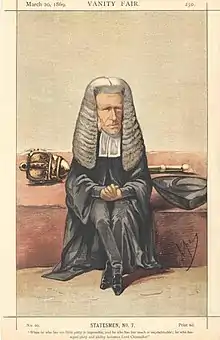William Wood, 1st Baron Hatherley
William Page Wood, 1st Baron Hatherley, PC (29 November 1801 – 10 July 1881) was a British lawyer and statesman who served as a Liberal Lord High Chancellor of Great Britain between 1868 and 1872 in William Ewart Gladstone's first ministry.
The Lord Hatherley | |
|---|---|
 | |
| Lord High Chancellor of Great Britain | |
| In office 9 December 1868 – 15 October 1872 | |
| Monarch | Victoria |
| Prime Minister | William Ewart Gladstone |
| Preceded by | The Lord Cairns |
| Succeeded by | The Lord Selborne |
| Personal details | |
| Born | 29 November 1801 London |
| Died | 10 July 1881 (aged 79) London |
| Nationality | British |
| Political party | Liberal |
| Spouse(s) | Charlotte Moor
(m. 1830; died 1878) |
| Alma mater | |


Background and education
Wood was born in London, the second son of Sir Matthew Wood, 1st Baronet,[1] an alderman and Lord Mayor of London who became famous for befriending Queen Caroline and braving George IV. Sir Evelyn Wood and Katharine O'Shea were his nephew and niece respectively.
He was educated at Winchester College, from which he was expelled after a revolt against the headmaster, Woodbridge School, Geneva University, and Trinity College, Cambridge, where he became a fellow after being 24th wrangler in 1824.[2]
Legal and political career
Wood entered Lincoln's Inn, and was called to the Bar in 1824, studying conveyancing in John Tyrrell's chambers. He soon obtained a good practice as an equity draughtsman and before parliamentary committees. In 1845 he became a Queen's Counsel, and in 1847 was elected to parliament for the city of Oxford as a Liberal. In 1849 he was appointed Vice-Chancellor of the County Palatine of Lancaster, and in 1851 was made Solicitor General for England and Wales and knighted,[3] vacating the former position in 1852. When his party returned to power in 1853, he was raised to the bench as a Vice-Chancellor.
In 1868 he was made a Lord Justice of Appeal, but before the end of the year was selected by Gladstone to be Lord High Chancellor of Great Britain and was raised to the peerage as Baron Hatherley, of Down Hatherley in the County of Gloucester.[4] He retired in 1872 owing to failing eyesight, but sat occasionally as a law lord.
Family
Wood married Charlotte, daughter of Edward Moor, in 1830. They had no children. Charlotte's death in 1878 was a great blow to Wood, from which he never recovered, and he died in London on 10 July 1881, aged 79. Both are buried in the churchyard in Great Bealings, where Charlotte's brother was rector. The title became extinct on his death.
Arms
|
See also
- Page Wood Baronets
- Pilcher v Rawlins[6]
References
- thepeerage.com William Page Wood, 1st and last Baron Hatherley
- "Wood, William Page (WT820WP)". A Cambridge Alumni Database. University of Cambridge.
- "No. 21201". The London Gazette. 18 April 1851. p. 1045.
- "No. 23449". The London Gazette. 11 December 1868. p. 6591.
- Debrett's Peerage. 1876.
- COURT OF APPEAL IN CHANCERY – PILCHER v. RAWLINS.
External links
| Wikimedia Commons has media related to William Wood, 1st Baron Hatherley. |
| Wikiquote has quotations related to: William Wood, 1st Baron Hatherley |
- Hansard 1803–2005: contributions in Parliament by William Wood
- Portraits of William Page Wood, Baron Hatherley at the National Portrait Gallery, London

| Parliament of the United Kingdom | ||
|---|---|---|
| Preceded by Donald Maclean James Langston |
Member of Parliament for Oxford 1847–1853 With: James Langston |
Succeeded by James Langston Edward Cardwell |
| Legal offices | ||
| Preceded by Sir Alexander Cockburn, Bt |
Solicitor General 1851–1852 |
Succeeded by Sir Fitzroy Kelly |
| Preceded by Sir John Stuart |
Vice-Chancellor of the High Court 1853–1868 |
Succeeded by Sir Richard Malins |
| Political offices | ||
| Preceded by The Lord Cairns |
Lord High Chancellor of Great Britain 1868–1872 |
Succeeded by The Lord Selborne |
| Peerage of the United Kingdom | ||
| New creation | Baron Hatherley 1868–1881 |
Extinct |
.svg.png.webp)